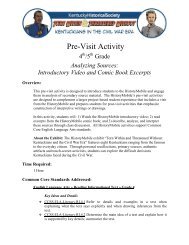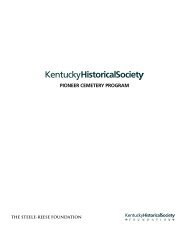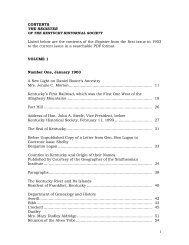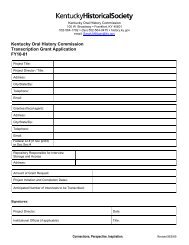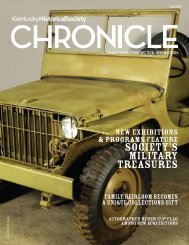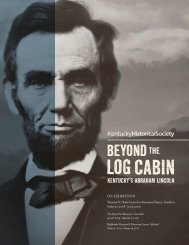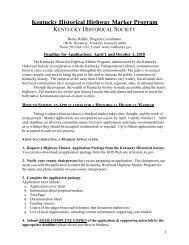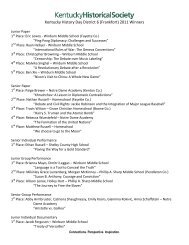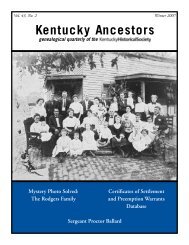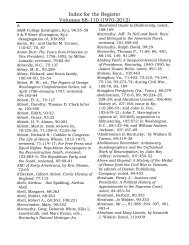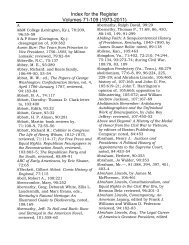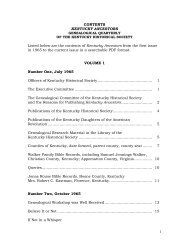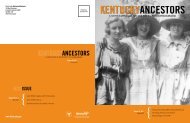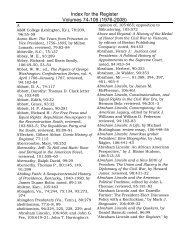Kentucky Ancestors, Volume 46, Number 3 - Kentucky Historical ...
Kentucky Ancestors, Volume 46, Number 3 - Kentucky Historical ...
Kentucky Ancestors, Volume 46, Number 3 - Kentucky Historical ...
Create successful ePaper yourself
Turn your PDF publications into a flip-book with our unique Google optimized e-Paper software.
all shocks to the body should be transcended and<br />
ignored as in slave punishments. So he said nothing,<br />
hoped for the best, and carried the painful burden<br />
with him to Fort Anderson, where he could not<br />
shake it. The regimental hospital records for the 8 th<br />
USCHA reveal that Edmund suffered with cramp<br />
colic (appendicitis), internal fever, convulsions, and<br />
vertigo from the first day he entered the military<br />
until October 1864. According to one regimental<br />
record from the company muster roll for November<br />
and December 1864, Edmund was on daily duty<br />
in the bakery. As the days and months wore on, the<br />
injured tissue in Pvt. Fauntleroy’s chest produced<br />
inflammation and fever, and eventually formed a<br />
lipomatous tumor the size of a goose egg. 33 I do<br />
not think my ancestor expected unequal pay, lean<br />
government rations, or the blatant discrimination<br />
he encountered in the army. He soon learned<br />
that soldiering was an ambiguous and complex<br />
proposition. The personal sacrifice and hardship of<br />
throwing off the yoke of slavery meant the rules he<br />
lived by had changed. I suspect Edmund wanted to<br />
die a free man rather than live as a slave.<br />
Pvt. Fauntleroy’s deployment took him east to<br />
Virginia and the District of Columbia as one of<br />
the 23,703 black <strong>Kentucky</strong> troops 34 representing<br />
56.5 percent of the 41,935 eligible slaves and<br />
freeman between the ages of eighteen and fortyfive.<br />
<strong>Kentucky</strong> provided thirteen per cent of the<br />
178,895 black Union troops. 35 In February 1865<br />
the 8 th USCHA left Fort Anderson and headed out<br />
into the countryside. Exposure to cold temperatures,<br />
hard marching, and fatigue perturbed the soldiers<br />
and hindered some. They encountered all kinds<br />
of weather conditions, camped in open fields, and<br />
occupied abandoned buildings. Carded medical<br />
records (CMR) relate to personnel admitted to<br />
hospitals for treatment 36 and Fontroy’s CMR<br />
documents his admission to the field hospital at<br />
Camp Lincoln in City Point, Virginia, on 20 May<br />
1865. The company muster roll for May-June 1865<br />
counted him absent and hospitalized at Fortress<br />
Monroe, Virginia. Fontroy was diagnosed with<br />
chronic rheumatism (an ailment which compromises<br />
the immune system) and honorably discharged<br />
from the Army, 17 June 1865, by order of the War<br />
Department while a patient in the general hospital<br />
at Fort Monroe. The ailing private was discharged<br />
in error as Edward Fontroy. In a letter to the<br />
124 | <strong>Kentucky</strong> <strong>Ancestors</strong><br />
Second Auditor of the U. S. Treasury, Washington,<br />
D.C., dated 16 August 1889, 37 from Hopkinsville,<br />
<strong>Kentucky</strong> (as part of the claims evaluation process to<br />
retain pension benefits), veteran Edmund Fauntleroy<br />
attested:<br />
Regiment moved from Paducah to<br />
Mayfield, <strong>Kentucky</strong> then back to<br />
Paducah, thence to Washington, D.C.<br />
[His unit arrived in Washington, D. C.,<br />
April 1865], from there to City Point,<br />
Virginia; from there the regiment starting<br />
to Texas.<br />
Having previously contracted the<br />
rheumatism and being unable to be with<br />
his regiment was left at Fortress Monroe,<br />
Virginia where he remained under<br />
treatment of doctors for more than two<br />
months.<br />
He was first attacked with [rheumatism]<br />
in Washington, D.C. when he was taken<br />
with the disease. His knees and ankles, in<br />
fact all part of his legs was swollen up to<br />
two or three times their size accompanied<br />
by the most severe pain. 38<br />
Had great-granddad been healthy at the end of<br />
the war he would have transferred to Texas with a<br />
large contingent of black regiments to discourage<br />
French operations in Mexico. Some soldiers were<br />
sick when they arrived in Texas; others got sick<br />
after landing and many died from scurvy. On<br />
20 September 1889, veteran Fauntleroy filed a<br />
Declaration of Invalid Pension under the Pension<br />
Act of 17 June 1890, although eight years passed<br />
before he received monthly monetary benefits, which<br />
commenced on 2 April 1897. When Edmund<br />
applied for his pension he had to provide information<br />
on his wife, when and where he married her, as<br />
well as the names and birthdates of all his children.<br />
Eventually the Pension Bureau rated the rib injury<br />
as debilitating and awarded him benefits for both<br />
ailments. Edmund remained a Civil War pensioner<br />
until August 1924, but not without struggle.



